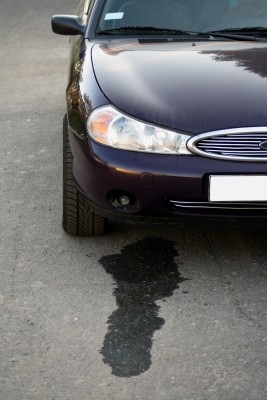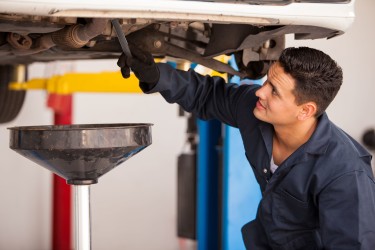What is Leaking From My Car?
 To a car owner, there are few worse feelings than noticing a puddle of liquid underneath your car. Obviously something in your car is leaking, but just how big of a concern is the dripping fluid? Today, we take a look at some of the more common leaks that occur in your vehicle.
To a car owner, there are few worse feelings than noticing a puddle of liquid underneath your car. Obviously something in your car is leaking, but just how big of a concern is the dripping fluid? Today, we take a look at some of the more common leaks that occur in your vehicle.
Common Car Leaks
Looking at the color of the puddle is one of the easiest ways to determine what’s leaking from your vehicle. Here are a couple of colors to look for.
Yellowish/Green – This is an indicator of a problem with your coolant or antifreeze. If your car can’t adequately stay cool, it could lead to major car problems down the road. This liquid could also be pink in color.
Light Brown/Black – This is a sign of an oil leak, and it may be coming from a variety of different places. It could be a sign of problems with your oil gasket, oil filter, oil coolant line or with your oil pressure.
Reddish Brown and Thin – This is a sign of a leak in your power steering, and time is your biggest enemy against a power steering leak. As cars age, you could spring a leak in your O-rings and seals. Simply replacing these seals can solve this problem.
Reddish Brown and Thick – A thick reddish stain is an indication that there’s a leak in your transmission. This is another issue that can cause serious problems if left untreated, so call a mechanic right away if you see a thick reddish substance under your vehicle.
Clear/Gray/Brown – This likely means their is a problem with your brake fluid, and can inhibit your ability to stop. Again, address this issue immediately.
Clear – A clear leak could also indicate that water is dripping from the radiator. If you just got back from a drive and you were running the air conditioner, the water could just be condensation from your radiator. If there’s a significant leak and you weren’t running your AC, you’ll want to swing into a mechanic.
-
Why Does my Car Pull to the Right or Left?May 21, 2013
Reasons your Car Pulls Ever get the feeling that your car is dragging or “pulling” to the left or right? This could be the result of several different factors, including: Vehicle alignment. Alignment keeps your tires parallel with one another and even with the ground. If the alignment is off, it can cause a car […]
-
New Car Technologies Will Cut Commute Time, Keep Drivers Safe
 Jan 22, 2014
Jan 22, 2014As we mentioned in a recent post, self-driving cars are expected to become the norm over the next 20 years. While the technology is still in its early stage of development, researchers believe self-driving vehicles will keep people safe and cut down on carbon emissions. Self-driving cars may be the way of the future, but […]
-
The Benefits of an Engine Flush
 Aug 12, 2015
Aug 12, 2015Your engine is the lifeblood of your vehicle, so it makes sense that you should take extra care of it. Considering all the tasks your engine is asked to preform, it’s no surprise that junk and debris can build up over time in your engine system. One way to get rid of that excess build up […]




